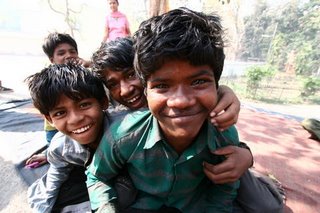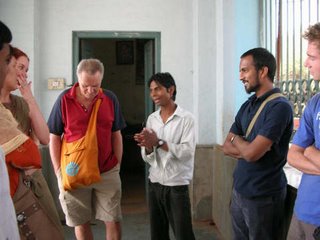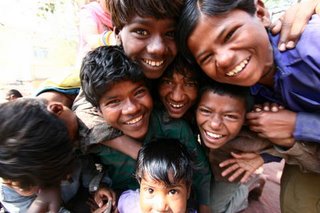 (Photo credit: Yashas Chandra)
(Photo credit: Yashas Chandra)
 (Photo Credit: Yashas Chandra)
(Photo Credit: Yashas Chandra)
 Have you ever wondered what life is like for street children who live in and around the New Delhi Railway station? If you’re anything like me, you’d probably never have even noticed them as you scrambled your way to catch the train to your vacation destination, or as you arrived, bedraggled and dreaming of your bed at home.
Have you ever wondered what life is like for street children who live in and around the New Delhi Railway station? If you’re anything like me, you’d probably never have even noticed them as you scrambled your way to catch the train to your vacation destination, or as you arrived, bedraggled and dreaming of your bed at home.
For most commuters, lives of the station-children strike us in brief bursts of horror and pity: the near-naked boy with no legs who slides his way through the filth of our compartment’s floors; the little girl with sun-streaked, matted hair who wafts through the compartment singing a tuneless melody. By and large, the ephemeral lives of these invisible children – who wander bereft of permanent shelter or family – remain hidden to even the most discerning of eyes.
Not for much longer, however. An innovative initiative, spearheaded by Salaam Baalak Trust, aims to demystify life on the streets in an ingenious manner: a two hour tour of the New Delhi Railway station and its environs, led by its true connoisseurs -- children who have grown up on the streets.
I arrived, breathless and apologetic, at the appointed hour and location, just as the tour began. Two young, smartly-dressed men addressed the group in near-perfect English and introduced themselves as the tour leaders. The first, Shekhar, described his career as a debutante actor. Javed, the second, discussed his aspirations to work with the UNDP after completing his Masters in Social Work.
The excellent oration and finesse of the leaders baffled me, and just as I opened my notebook to check whether I had misread the part about the tour being led by children from the streets, Shekhar added that he had, as a runaway child from
The tour leaders took us - a mélange of foreigners, Indians, and foreigner-Indians - across railway platforms, through traffic-choked arteries of Paharganj, and to favorite street children-hangouts. Seemingly nondescript locations were transformed, through the eyes of these unlikely story tellers, into the animated stage upon which the budding dreams and blighted hopes of children were played out every day. Pointing to the train-washing track, Javed revealed a nugget of street-life wisdom. “Children take their showers on those tracks, usually on Fridays, as it is a special day for station-dwellers. Not for religious purposes, but because that is the day that Bollywood films are released!”
As we stopped on Platform 12, Shekhar gave us a first hand account of the Station Mafia in true Pacino-style. “Nearly 300 runaway children arrive at the Station everyday. The mafia leader of a particular platform captures some of these children and trains them in skills such as pickpocketing, singing, begging, etc. The mandir,” Shekhar explained, pointing just across the station’s boundary wall, “is where the mafia leaders stay. A mandir is actually the safest place in
Trying not to contemplate the whereabouts of the gang leader of the platform I was standing on, I walked ahead hurriedly, stopping at a fruit stand. “Railway children have a special relationship with fruit sellers and chemists,” Javed pointed out. “Immediately after a luxury train arrives, children run through them to find uneaten fruit and then give it to the fruit seller. In return, the vendor allows them to sleep on his vendor-ceiling at night, and even protects them when the Station police arrive. The police sometimes beat the children for no reason, though,” he says ruefully, “and that’s where the chemist shop comes in handy.”
The importance of these symbiotic relationships is not to be understated, the leaders emphasized. “Though there is suffering, life on the railways is also about friendship, love, and a strong feeling of community. Even in the direst of circumstances, people look out for each other.”
My admiration for the leaders piqued as they told me of their plans to publicize the tour in an effort to draw national attention to the lives of station-children. “We want more and more Indians, especially students, to join us and learn about the issues that these children face,” said Shekhar. For an inimitable insight into the courage, determination, and resilience of the human spirit – and for some fun – book your place on a tour. For more information, contact Shekhar at +919873130383.
(To be published by The Hindu)
*********
Dear Reader: I didn't mean for this to be an article, really. I thought I would it would be an interesting experience, for experience's sake. But I enjoyed the tour, thought the idea was fantastic, and figured that making an article out of it would be a great way to spread publicity about it. So, the article is to be published at some point, but I've put it up now to start spreading the word..
5 comments:
Smita, I am quite moved by your article. Kudos to those two gentlemen who made better lives today leaving behind the platform life. Salaam Balak trust too has contributed towards this. Hope that more and more people read this piece and hope that the lifes of such kids get better. Amen!
Smita, I am quite moved by your article. Kudos to those two gentlemen who made better lives today leaving behind the platform life. Salaam Balak trust too has contributed towards this. Hope that more and more people read this piece and hope that the lifes of such kids get better. Amen!
thanks for the awesome article smita! it's always refreshing to see transformed folks transforming others, a la manav sadhna style :-)
Smita:
I have always thought about street children and the hapless life they lead, right from a tender age. But this thought never managed to come out in words and I dont think I am capable enough to do that either.
They face and lead, survive and some even suceed from this level, like shekar and his mate. I am glad that I read this one, and may be one day I can feel fit enough to write my interactions with them. I have worked with a NGO and learned that I am far inexperienced in life, even at 25, than these kids were. they have seen the real life.
PJ
quiet a moving article Smita.
Post a Comment